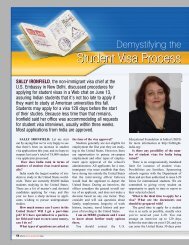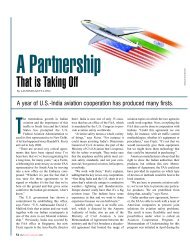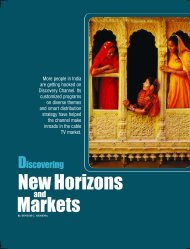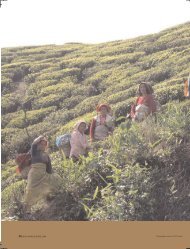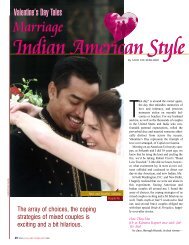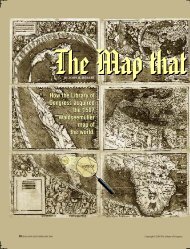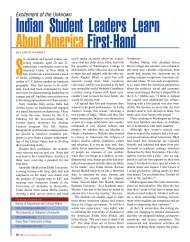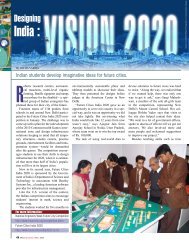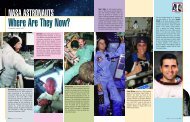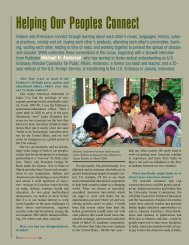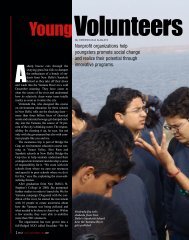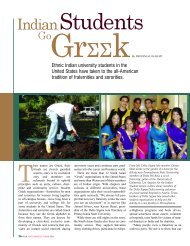Transcending Borders at the Jaipur Literature ... - SPAN Magazine
Transcending Borders at the Jaipur Literature ... - SPAN Magazine
Transcending Borders at the Jaipur Literature ... - SPAN Magazine
Create successful ePaper yourself
Turn your PDF publications into a flip-book with our unique Google optimized e-Paper software.
<strong>Transcending</strong><br />
<strong>Borders</strong><br />
<strong>at</strong> <strong>the</strong><br />
<strong>Jaipur</strong> Liter<strong>at</strong>ure<br />
Festival<br />
By STEVEN P. KERCHOFF<br />
Pico Iyer personifies <strong>the</strong> concept of<br />
a writer without borders—born in<br />
England to Indian parents, raised<br />
in <strong>the</strong> United St<strong>at</strong>es and <strong>the</strong><br />
United Kingdom, and now living<br />
in Japan. For Iyer, <strong>the</strong> whole world is<br />
equally alien or equally home. His writing<br />
explores <strong>the</strong> space between cultures,<br />
and <strong>the</strong> people who inhabit th<strong>at</strong><br />
space. Iyer writes in The Global Soul:<br />
Jet Lag, Shopping Malls, and <strong>the</strong> Search<br />
Goa-born writer and<br />
journalist Sonia<br />
Faleiro talks books<br />
with novelist Vikram<br />
Seth <strong>at</strong> <strong>the</strong> <strong>Jaipur</strong><br />
Liter<strong>at</strong>ure Festival.<br />
<strong>SPAN</strong> MARCH/APRIL 2009 45<br />
TEAAMMWOORRKK TEAAMMWOORK ARCHHIVVES ARRCHIVEESS<br />
WRITERS
TEAMWORK ARCHIVES<br />
for Home, “Having grown up simultaneously in three cultures,<br />
none of <strong>the</strong>m fully my own, I acquired very early <strong>the</strong> sense of<br />
being loosed from time as much as from space—I had no history,<br />
I could feel, and lived under <strong>the</strong> burden of no home.”<br />
Iyer was among <strong>the</strong> writers, editors, readers, publishers and<br />
performing artists who g<strong>at</strong>hered <strong>at</strong> Diggi Palace in <strong>Jaipur</strong>,<br />
Rajasthan, to engage in spirited convers<strong>at</strong>ion during <strong>the</strong> <strong>Jaipur</strong><br />
Liter<strong>at</strong>ure Festival 2009, sponsored in part by <strong>the</strong> U.S. Embassy<br />
in New Delhi. A range of genres were fe<strong>at</strong>ured, including not<br />
only belles lettres but also journalism, travel writing, history,<br />
biography and children’s liter<strong>at</strong>ure. The <strong>the</strong>me of writing th<strong>at</strong> transcends<br />
borders emerged repe<strong>at</strong>edly <strong>at</strong> <strong>the</strong> event, with participants<br />
Author Pico Iyer interacts with <strong>the</strong> audience <strong>at</strong> <strong>the</strong> <strong>Jaipur</strong><br />
Liter<strong>at</strong>ure Festival.<br />
from India, <strong>the</strong> United St<strong>at</strong>es, United Kingdom, Pakistan,<br />
Australia, Malaysia, China and Bangladesh.<br />
Chronicling his development, Iyer joked th<strong>at</strong> as a student of<br />
liter<strong>at</strong>ure he learned no marketable skills, only how to read and<br />
write. “The more I studied liter<strong>at</strong>ure, <strong>the</strong> more I was only qualified<br />
for unemployment.” Despite this modest claim, however, he<br />
went on to become an essayist with Time magazine. Iyer l<strong>at</strong>er<br />
took a leave of absence to write Video Night in K<strong>at</strong>hmandu: And<br />
O<strong>the</strong>r Reports from <strong>the</strong> Not-So-Far East, published in 1989<br />
amid an explosion of travel writing. In exploring <strong>the</strong> clash of<br />
cultures th<strong>at</strong> occurs when East meets West, Iyer saw a reflection<br />
of his own multicultural heritage. “To some extent,” he said, “it<br />
was my background speaking.”<br />
In contrast to this global soul, American memoirist Michael<br />
P<strong>at</strong>rick MacDonald focuses on one very specific place and time,<br />
yet he too conveys something universal about <strong>the</strong> human experience.<br />
In his deeply moving memoir, All Souls: A Family Story<br />
from Southie, MacDonald narr<strong>at</strong>es his experiences of growing<br />
up in <strong>the</strong> impoverished South Boston neighborhood known as<br />
Southie.<br />
MacDonald chronicles <strong>the</strong> neighborhood’s poverty, violence, and<br />
For more inform<strong>at</strong>ion:<br />
<strong>Jaipur</strong> Liter<strong>at</strong>ure Festival<br />
http://jaipurliter<strong>at</strong>urefestival.org/<br />
46 <strong>SPAN</strong> MARCH/APRIL 2009<br />
crime, which no one would<br />
acknowledge or discuss openly.<br />
This insular neighborhood skyrocketed<br />
to n<strong>at</strong>ional infamy in<br />
AJIT KUMAR<br />
TEAMWORK ARCHIVES<br />
Robinson, a poet who uses one name; writer and film director Sagari<br />
Chhabra and American author Michael MacDonald <strong>at</strong> a reception<br />
hosted by U.S. Deputy Chief of Mission Steven J. White in New<br />
Delhi after <strong>the</strong> liter<strong>at</strong>ure festival.<br />
1974 when riots broke out over <strong>the</strong> racial desegreg<strong>at</strong>ion of schools.<br />
In his remarks <strong>at</strong> <strong>the</strong> festival, MacDonald recounted his experience<br />
of leaving this neighborhood, “moving from a small,<br />
tight world which you thought was <strong>the</strong> only world.” He<br />
described his subsequent work as a community organizer in<br />
black and L<strong>at</strong>ino neighborhoods, where he found th<strong>at</strong> “people<br />
didn’t even know th<strong>at</strong> <strong>the</strong>re was such a thing as white poverty.”<br />
His decision to write a memoir grew out of his experience as a<br />
community organizer, when he heard mo<strong>the</strong>rs telling <strong>the</strong>ir stories<br />
as a way of reaching out to o<strong>the</strong>r people and witnessed <strong>the</strong><br />
impact of storytelling both on <strong>the</strong> audience and on <strong>the</strong> storytellers<br />
<strong>the</strong>mselves.<br />
MacDonald observed th<strong>at</strong> having a love/h<strong>at</strong>e rel<strong>at</strong>ionship<br />
with one’s place of origin is a universal experience, and th<strong>at</strong> a<br />
return to th<strong>at</strong> place can be a part of <strong>the</strong> healing process.<br />
Reminiscing about <strong>the</strong> connectedness and community and <strong>the</strong><br />
sense of being part of a larger social fabric, he st<strong>at</strong>ed, “It still to<br />
Writer Nadeem Aslam speaks <strong>at</strong> a session <strong>at</strong> <strong>the</strong> festival.
me is <strong>the</strong> best neighborhood in <strong>the</strong> world.”<br />
In a post-festival interview with <strong>SPAN</strong>’s<br />
Deepanjali Kak<strong>at</strong>i, MacDonald described<br />
writing as “…finding a language to speak<br />
about sometimes unspeakable things.” He<br />
said, “Writers kind of sort things out for o<strong>the</strong>rs<br />
by de-tangling chaos and making a story<br />
th<strong>at</strong> has some value. Ultim<strong>at</strong>ely, when we do<br />
this, we are also sorting things out for ourselves.<br />
And if we really go <strong>the</strong>re for ourselves,<br />
<strong>the</strong>n it tends to work for o<strong>the</strong>rs...it<br />
tends to be universal. And basically, turning<br />
any tragedy and pain into a gift (for o<strong>the</strong>rs<br />
but ultim<strong>at</strong>ely for ourselves) ought to be our<br />
mantra for making this world livable for all.”<br />
MacDonald told <strong>SPAN</strong> th<strong>at</strong> his second<br />
book, Easter Rising, deals with “th<strong>at</strong> oftasked<br />
question” of how he avoided being<br />
trapped in Southie’s cycle of violence and<br />
poverty. “…For me it is ultim<strong>at</strong>ely not about getting out, but<br />
instead learning to embrace all th<strong>at</strong> we come from and learning<br />
to work with it in order to go forward. So getting out, seeing <strong>the</strong><br />
bigger world was one step toward my own ‘rising,’ but <strong>the</strong><br />
return home (in a new way, with a new understanding of how to<br />
be in <strong>the</strong> world in all of its chaos and pain) was just as important....<strong>the</strong><br />
return home, to Southie, to learning to embrace everything<br />
about my family and my community (wherever I may end<br />
Journalist and activist Rami Chhabra and U.S. Deputy Chief of<br />
Mission Steven J. White during a reception for writers <strong>at</strong> his<br />
residence in New Delhi.<br />
up geographically).”<br />
In <strong>the</strong> fiction of Nadeem Aslam, a British writer of Pakistani<br />
origin, <strong>the</strong> social fabric is also rent asunder by violence, and by<br />
warfare and religious fundamentalism. Aslam has often publicly<br />
expressed his admir<strong>at</strong>ion for <strong>the</strong> Sri Lankan-born Canadian writer<br />
Michael Onda<strong>at</strong>je, author of The English P<strong>at</strong>ient. When a member<br />
of <strong>the</strong> audience asked Aslam about<br />
Onda<strong>at</strong>je’s influence on his writing<br />
one might have expected his answer to<br />
focus on style, since both writers<br />
exhibit an extraordinarily lush prose.<br />
Aslam responded, however, th<strong>at</strong> it<br />
was Onda<strong>at</strong>je who liber<strong>at</strong>ed him geographically<br />
and inspired him to<br />
expand beyond his own experiences<br />
of Pakistan and England and to<br />
explore <strong>the</strong> entire world in his writing.<br />
In a session on travel writing,<br />
moder<strong>at</strong>or William Dalrymple, <strong>the</strong><br />
British writer, asked Vikram Seth,<br />
who is perhaps better known as a<br />
novelist and poet, wh<strong>at</strong> <strong>the</strong> travel<br />
writer offers to <strong>the</strong> reader th<strong>at</strong> <strong>the</strong><br />
Encyclopædia Britannica does not.<br />
Seth responded th<strong>at</strong> he hadn’t originally<br />
planned to write a book when he hitchhiked through Tibet,<br />
but people kept asking him about <strong>the</strong> trip. When he wrote a few<br />
pages about his journey, his f<strong>at</strong>her encouraged him to seek out a<br />
publisher. The resultant book, From Heaven Lake: Travels<br />
Through Sinkiang and Tibet, focuses not merely on <strong>the</strong> journey<br />
itself but on <strong>the</strong> personalities and <strong>the</strong> encounters, <strong>the</strong> people as<br />
well as <strong>the</strong> places. Born in Calcutta and educ<strong>at</strong>ed in <strong>the</strong> United<br />
St<strong>at</strong>es, as well as in England and China, Seth is a traveler whose<br />
writing reflects his experience living in several countries. During<br />
his years <strong>at</strong> Stanford University in California, he studied economics,<br />
poetry and Mandarin and returned <strong>the</strong>re to teach writing.<br />
A polyglot, he is influenced by a variety of cultures, yet says<br />
English is <strong>the</strong> “instrument” in which he conveys his art.<br />
Iyer described travel writing as autobiography in disguise, an<br />
inquiry, a convers<strong>at</strong>ion and a self-portrait, “using a place to<br />
work things through th<strong>at</strong> you wouldn’t be able to work through<br />
<strong>at</strong> home.” All of <strong>the</strong> gre<strong>at</strong> travel writers, he said, are “fiction<br />
writers on holiday.”<br />
In Ghost Train to <strong>the</strong> Eastern Star: On <strong>the</strong> Tracks of <strong>the</strong><br />
Gre<strong>at</strong> Railway Bazaar, American travel writer Paul Theroux<br />
describes <strong>the</strong> experience of serious readers meeting <strong>the</strong>ir counterparts.<br />
In a passage th<strong>at</strong> captures perfectly <strong>the</strong> spirit of <strong>the</strong><br />
<strong>Jaipur</strong> Liter<strong>at</strong>ure Festival, he writes, “I think most serious and<br />
omnivorous readers are alike—intense in <strong>the</strong>ir dedic<strong>at</strong>ion to <strong>the</strong><br />
word, quiet-minded, but relieved and eagerly talk<strong>at</strong>ive when<br />
<strong>the</strong>y meet o<strong>the</strong>r readers and kindred spirits.”<br />
MacDonald experienced this during his interactions with<br />
people in India. It’s one thing to find th<strong>at</strong> <strong>the</strong>re is a universal<br />
language th<strong>at</strong> allows communic<strong>at</strong>ion from South Boston in<br />
Massachusetts to <strong>the</strong> South Bronx in New York, he said. “But<br />
it’s ano<strong>the</strong>r thing to find out, when traveling to <strong>the</strong> o<strong>the</strong>r side of<br />
<strong>the</strong> globe, to India, th<strong>at</strong> we do indeed have <strong>the</strong> capacity to tell<br />
stories and to hear stories with understanding and emp<strong>at</strong>hy and<br />
total connection to <strong>the</strong> universal elements.”<br />
N<strong>at</strong>ional Library Week<br />
Celebr<strong>at</strong>es: America’s libraries<br />
Promotes: Use of libraries<br />
Since: 1958<br />
This year: April 12 to 18<br />
Theme: Worlds connect @ your library<br />
Sponsored by: American Library Associ<strong>at</strong>ion<br />
For more inform<strong>at</strong>ion:<br />
N<strong>at</strong>ional Library Week<br />
http://www.ala.org/ala/aboutala/offices/pio/<br />
n<strong>at</strong>libraryweek/nlw.cfm<br />
American Libraries in India<br />
http://americanlibrary.in.library.net/<br />
http://newdelhi.usembassy.gov/americanlibrary.html<br />
AJIT KUMAR<br />
As inform<strong>at</strong>ion resource officer for <strong>the</strong> U.S. Embassy in New Delhi,<br />
Steven P. Kerchoff manages American Libraries in India, Bangladesh,<br />
Nepal and Sri Lanka. Deepanjali Kak<strong>at</strong>i also contributed to this article.<br />
<strong>SPAN</strong> MARCH/APRIL 2009 47




